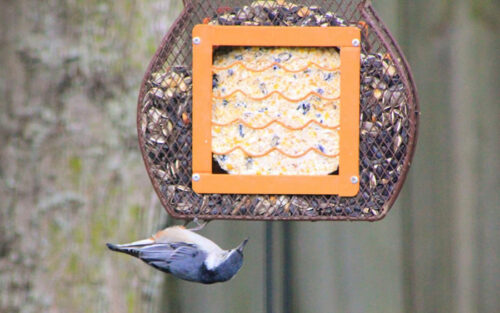 Purdue University - Extension - Forestry and Natural Resources
Purdue University - Extension - Forestry and Natural Resources
Got Nature? Blog
Starting in May, the Indiana Department of Natural Resources (DNR) began to receive reports of sick and dying songbirds from several counties around the state. As of now, the cause of the illness remains a mystery although submitted specimens have tested negative for avian influenza and West Nile virus according to the DNR. Affected birds have white crust and discharge around the eyes and damage to their nervous system. Reports of sick birds have expanded to many more counties in Indiana.
Several diseases that affect songbirds are transmitted from one animal to another. Bird feeders can increase the likelihood of disease transmission by facilitating close contact among birds. Even though the disease and its mode of transmission in this case is unknown, the DNR is recommending all Hoosiers remove their birdfeeders.
 Officials recommend the following steps:
Officials recommend the following steps:
- Use the DNR sick/dead wildlife reporting tool at on.IN.gov/sickwildlife to alert DNR staff.
- Stop feeding birds until the mortality event has concluded.
- Clean feeders and baths with a 10% bleach solution.
- Avoid handling birds. If you need to handle birds, wear disposable gloves.
- When removing dead birds, wear disposable gloves and place birds and gloves in a sealable plastic bag to dispose with household trash.
- Keep pets away from sick or dead birds as a precaution.
- Proper care of bird feeders and seed is an important part of preventing disease transmission at birdfeeders.
The Audubon Society recommends the following best practices:
- Clean feeders monthly using one part bleach to nine parts warm water. Soak the feeder in the solution for a few minutes, rinse, and air dry.
- If uneaten food is accumulating in or under feeders, consider using less food or switch to a seed more to the birds’ liking.
- If birds are fighting over space at a feeder, consider adding more feeders to alleviate the congestion that can potentially be responsible for the rapid spread of disease.
- Avoid throwing large amounts of food on the ground or alternate ground feeding areas so that uneaten food does not accumulate and develop bacteria or mold.
Resources:
DNR recommends removal of birdfeeders statewide – June 25, Indiana Department of Natural Resources
Birdfeeder tips, The National Audubon Society
Birds and Residential Window Strikes: Tips for Prevention, The Education Store, Purdue Extension resource center
Breeding Birds and Forest Management: the Hardwood Ecosystem Experiment and the Central Hardwoods Region, The Education Store
Managing Woodlands for Birds Video, Purdue Extension-Forestry and Natural Resources YouTube Channel
Brian MacGowan, Wildlife Extension Specialist
Purdue University, Department of Forestry and Natural Resources

Recent Posts
- Experience Indiana’s Sandhill Crane Fall Migration
Posted: November 8, 2024 in Forestry, Wildlife - Purdue Extension’s Showcase, Impacting Indiana
Posted: in Community Development, Forestry, Forests and Street Trees, Gardening, Land Use, Natural Resource Planning, Timber Marketing, Urban Forestry, Wildlife, Wood Products/Manufacturing, Woodlands - Deer Season is Here, MyDNR and Wild Bulletin
Posted: in Forestry, Wildlife, Woodlands - ID That Tree: Learn to Identify Hoptree/Wafer Ash
Posted: October 30, 2024 in Forestry, Forests and Street Trees, How To, Urban Forestry, Wildlife - Publication – Handbook on Processing Fish for Small-Scale Fish Farmers
Posted: October 17, 2024 in Aquaculture/Fish, Aquatic/Aquaculture Resources, How To, Publication, Wildlife - When Roundup Isn’t Roundup – Purdue Landscape Report
Posted: in Forestry, Gardening, Plants, Urban Forestry - American Citizen Planner – Indiana Program Celebrating 4 Years of Impact
Posted: October 16, 2024 in Community Development, Land Use - IN DNR Deer Updates – Epizootic Hemorrhagic Disease Detected in Several Areas in Indiana
Posted: in Alert, Disease, Forestry, How To, Wildlife, Woodlands - Black Spot of Elm – Purdue Landscape Report
Posted: October 15, 2024 in Urban Forestry, Wildlife, Woodlands - Economics and Aquaculture Expert Kwamena Quagrainie is Featured Specialist in ANR Newsletter
Posted: in Aquatic/Aquaculture Resources, Great Lakes
Archives
Categories
- Alert
- Aquaculture/Fish
- Aquatic/Aquaculture Resources
- Ask the Expert
- Christmas Trees
- Community Development
- Disease
- Drought
- Forestry
- Forests and Street Trees
- Gardening
- Got Nature for Kids
- Great Lakes
- How To
- Invasive Animal Species
- Invasive Insects
- Invasive Plant Species
- Land Use
- Natural Resource Planning
- Nature of Teaching
- Plants
- Podcasts
- Ponds
- Publication
- Safety
- Spiders
- Timber Marketing
- Uncategorized
- Urban Forestry
- Webinar
- Wildlife
- Wood Products/Manufacturing
- Woodland Management Moment
- Woodlands